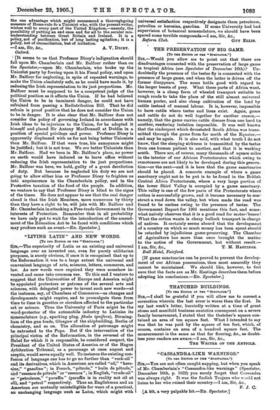[TO TER EDITOR OP THE "SPECTATOR. " ]
SIR, Would you allow me to point out that there are disadvantages connected with the preservation of large game in tropical Africa (see Spectator of December 16th) ? Un- doubtedly the presence of the tsetse fly is connected with the presence of large game, and when the latter is driven off the former disappears. The same holds good with regard to the larger beasts of prey. What these parts of Africa want, however, is a cheap form of wheeled transport suitable to rough roads to take the place of the still almost universal human porter, and also cheap cultivation of the land by cattle instead of manual labour. It is, however, impossible to have cattle where tsetse and lions exist. Again, game and cattle do not do well together for another reason,— namely, that the game carries cattle disease from one herd to another, rendering isolation impossible. It was well known that the rinderpest which devastated South Africa was trans- mitted through the game from far north of the Equator,— and may be again. It is also said, with what truth I do not know, that the sleeping sickness is transmitted by the tsetse from one human patient to another, and that it is working south. There are, of course, many thousands of square miles in the interior of our African Protectorates which owing to remoteness are not likely to be developed during this genera- tion—or the next—and it is here that the game sanctuaries should be placed. A concrete example of where a game sanctuary ought not to be put is to be found in the British Central Africa Protectorate, where a very large portion of the lower Shire Valley is occupied by a game sanctuary. This valley is one of the few parts of the Protectorate where cotton is successfully grown, and it became necessary to con- struct a road down the valley, but when made the road was found to be useless owing to the presence of tsetse. The Government Report for 1905 mentions this fact, and some- what naively observes that it is a good road for motor-'buses ! What the cotton wants is cheap bullock transport in charge of natives. It certainly seems absurd that the development of a country on which so much money has been spent should be retarded by injudicious game-preserving. The Chamber of Agriculture has more than once brought the matter to the notice of the Government, but without result.—
I am, Sir, &c., T. M. HASTINGS. Bull Hotel, Pairford.
[If game sanctuaries can be proved to prevent the develop- ment of our African possessions, then most assuredly they cannot be maintained. We should like, however, to feel sure that the facts are as Mr. Hastings describes them before adopting his conclusions.—En. Spectator.] THATCHED BUILDINGS.






































 Previous page
Previous page